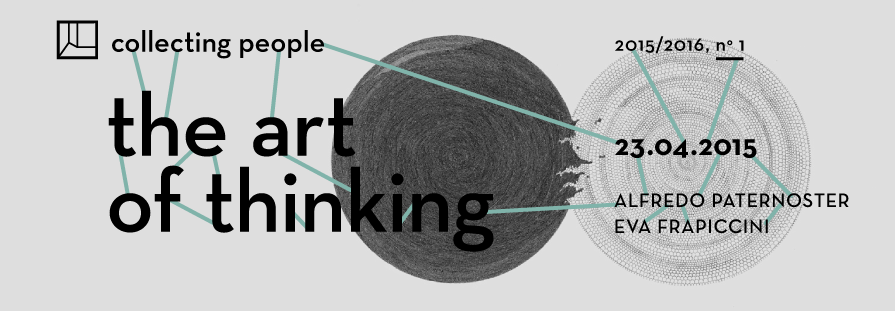COLLECTING PEOPLE / THE ART OF THINKING
RELATIONS BETWEEN ARTISTIC AND PHILOSOPHICAL RESEARCH
curated by Clara Madaro
The Diogene Tram will be the site of the inauguration on April 23, 2015 at 5:30 p.m. of Collecting People 2015/2016 – The Art of Thinking, a series of encounters combining artistic and philosophical research on urgent topics for both disciplines. If the philosopher is a friend of knowledge, we cannot understand what philosophy is until we understand what it means to “be friends”. Each appointment is aimed at interweaving a relationship of friendship between art and philosophy around the theoretical and applied interests shared by the two guests, highlighting the specificity of their contributions and languages.
The crux of their own research is presented by a philosopher and an artist or a curator; then a conversation between the two will follow. Thinking together, comparing languages, gathering theoretical ideas and mutual applications, clarifying and complicating their ideas in a direct confrontation with another reality: these are the processes that are meant to be triggered. The encounters gradually deal with some of the difficulties of contemporary research that, in addition to involving a comparison of neuroscience, biology, economics, and social sciences, have a pervasive importance in everyday life where their concrete aspects emerge in the reasoning, talking, relationships, in the representative gaps, and the uncertainties. The art of thinking is a double opportunity: on the one hand, it allows the general public to become familiar with the research methods of artists, curators, and philosophers, and on the other hand, researchers will be able to answer questions on the nature, the narrative, and the definition of their work. The encounters will take place at the Diogene Tram on the roundabout at Corso Regio Parco/Corso Verona, in Turin.
EVENTS
Feeling you exist. Perception, emotion and memory. (23/04/2015, h.5,30 p.m)
With Alfredo Paternoster (Professor of Philosophy of the Mind at the University of Bergamo, and Doctorate Program in Humanities of Turin University, and at FINO – Consortium of Doctorate in Philosophy in the North West of Turin) and Eva Frapiccini (Artist and Adjunct Professor at the Academy of Fine Arts in Bologna and the IED-European Institute of Design).
What relationship does philosophical and artistic research have with the knowledge coming from neuroscience and cognitive sciences in regard to the issue of construction of personal and collective identity?
Relating with everyday objects. Form, function, and social relationships. (22/05/2015, h.6,00 p.m.)
With Maria Grazia Turri (Adjunct professor of corporate communication languages, University of Turin) and Manuele Cerutti (Artist).
What is an everyday object? How do we relate philosophically and artistically to an everyday object when it comes to representing or defining it?
Illusion. The difference between perception and knowledge. (26/06/2015, h.6.00 p.m.)
Alberto Voltolini (Professor of Philosophy of the Mind at the University of Bergamo, and Doctorate Program in Humanities of Turin University, and FINO – Doctorate in Philosophy Consortium of the North West) and Martina Bassi (Artist and Professor of Philosophy).
Why is it that we can’t stop deluding ourselves perceptually? The artistic and philosophical research reflecting on perception.
Moving away from the center. Thinking without anthropocentrism. (09/07/2015, h. 6.00 p.m.)
Leonardo Caffo (Ph.d in Philosophy, University of Turin) and Marco Scotini (Director of the Department of Visual Arts and Curatorial Studies, NABA, New Academy of Fine Arts in Milan, curator and critic).
How can artistic and philosophical research identify ways of thinking and practicing an ecological discourse?

